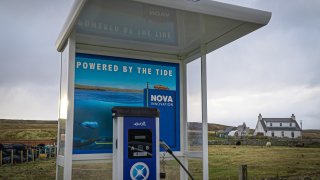
- The waters around Scotland are home to a number of interesting projects focused on tidal power.
- While there is excitement surrounding the potential of marine energy, its current footprint remains small.
An electric vehicle charging point which uses tidal energy has started operations, providing road users on an island north of mainland Scotland with a new, renewable option for running their cars.
The facility is located on Yell, which is part of Shetland, an archipelago of roughly 100 islands. The charging point gets its electricity from Nova Innovation's Shetland Tidal Array, a four turbine installation in Bluemull Sound, a strait between Yell and another island called Unst.
In an announcement Monday, Nova Innovation described the project as "the first ever electric vehicle … charge point where drivers can 'fill up' directly from a tidal energy source." A battery storage system has also been deployed to ensure a constant supply for vehicles.
Get DFW local news, weather forecasts and entertainment stories to your inbox. Sign up for NBC DFW newsletters.
The Scottish government is one of many around the world looking to move away from internal combustion engine vehicles. It wants to phase out the need for new diesel and gasoline vans and cars by the year 2030. Funding for the project on Yell has come from Transport Scotland, the country's transport agency.
Scotland's strengths
Among those reacting to Monday's announcement about the project on Yell was Fabrice Leveque, who is head of policy at WWF Scotland.
Money Report
"It's great to see tidal technology being used to help decarbonise part of Scotland's transport sector in the islands," he said, adding that Scotland was "well placed to continue to lead in developing this technology, which will help to cut climate emissions and create skilled, green jobs."
"Our islands have an abundance of renewable resources, including wind, tidal and solar, which when harnessed with care, could bring multiple economic and social benefits to remote and rural communities across Scotland," Leveque went on to state.
The waters around Scotland are home to a number of interesting projects focused on tidal power. These include the first phase of the MeyGen tidal stream development, which uses four 1.5 megawatt turbines. The project's majority owner is London-listed Simec Atlantis Energy.
While there is excitement surrounding the potential of marine energy, its current footprint remains small. Recent figures from Ocean Energy Europe (OEE) show that only 260 kilowatts (kW) of tidal stream capacity was added in Europe last year, while just 200 kW of wave energy was installed. By contrast, 2020 saw 14.7 gigawatts of wind energy capacity installed in Europe, according to industry body WindEurope.
While tidal has a long way to go to catch up with other renewable sources such as wind and solar, it does have one potential advantage: predictability. Tidal currents, OEE says, "are caused by the gravitational forces of the sun and the moon." The fact that tidal energy generation is influenced by "well-known cycles of the moon, sun and earth" rather than the weather means "it is predictable hundreds of years in advance."
The importance of infrastructure
If countries are to ramp up their electric vehicle offering in the years ahead and move away from gasoline and diesel, reliable and sufficient charging infrastructure will be crucial.
Adequate charging options will also help challenge perceptions surrounding "range anxiety," a term which refers to the idea that electric vehicles aren't able to undertake long journeys without losing power and getting stranded.
While the project on Yell is small-scale, it is part of a wider shift focused on the development of charging infrastructure.
The U.K.'s first forecourt dedicated to charging electric vehicles opened for business last December, for example, while the Volkswagen Group wants to significantly increase the number of charging facilities in Europe, North America and China.






